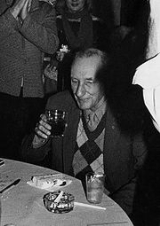
William Lee; 5 February 1914 – ) was an American novelist, poet, essayist and spoken word
performer. A primary figure of the Beat Generation
and a major postmodernist
author, he is considered to be "one of the most politically trenchant, culturally influential, and innovative artists of the 20th century." His influence is considered to have affected a range of popular culture as well as literature.
A ghost in daylight on a crowded street.![]()
The junk merchant doesn't sell his product to the consumer, he sells the consumer to his product. He does not improve and simplify his merchandise. He degrades and simplifies the client.![]()
Cut word lines — Cut music lines — Smash the control images — Smash the control machine — Burn the books — Kill the priests — Kill! Kill! Kill!![]()
Communication must become total and conscious before we can stop it.![]()
1. Never give anything away for nothing. 2. Never give more than you have to (always catch the buyer hungry and always make him wait). 3. Always take back everything if you possibly can.![]()
You know, they ask me if I were on a desert island and I knew nobody would ever see what I wrote, would I go on writing. My answer is most emphatically yes. I would go on writing for company. Because I'm creating an imaginary — it's always imaginary — world in which I would like to live.![]()
The hallucinogens produce visionary states, sort of, but morphine and its derivatives decrease awareness of inner processes, thoughts and feelings. They are pain killers; pure and simple. They are absolutely contraindicated for creative work, and I include in the lot alcohol, morphine, barbiturates, tranquilizers — the whole spectrum of sedative drugs.![]()
A paranoid man is a man who knows a little about what's going on.![]()
As a young child Audrey Carsons wanted to be writers because writers were rich and famous. They lounged around Singapore and Rangoon smoking opium in a yellow pongee silk suit. They sniffed cocaine in Mayfair and they penetrated forbidden swamps with a faithful native boy and lived in the native quarter of Tangier smoking hashish and languidly caressing a pet gazelle.![]()

